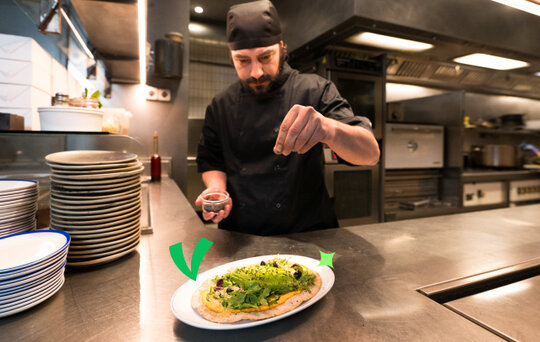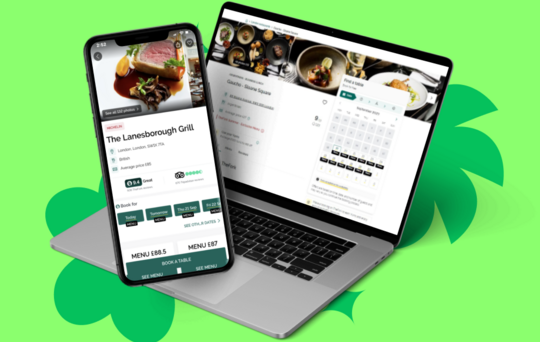Restaurant Reputation Management: A Comprehensive Guide

A restaurant’s reputation can be its greatest asset or biggest challenge. With diners increasingly turning to reviews, ratings, and social media to decide where to eat, managing your online presence is key to success.
This guide will help you understand why reputation matters and how you can handle customer feedback effectively to build a strong, positive image that keeps customers satisfied and eager to return.
What is restaurant reputation management?
Restaurant reputation management is the process of monitoring, influencing, and improving how your restaurant is perceived online. For UK restaurants, it’s essential in a competitive market where customer decisions are heavily influenced by online reviews and ratings.
A recent study found that 94% of diners check online reviews before choosing where to eat, and 3 out of 4 trust a company more if it has positive reviews1. That means even a small improvement in your star rating can significantly boost bookings. Managing your reputation effectively can ensure that your restaurant stands out, attracts new customers, and builds trust in a crowded dining scene.
How reputation management impacts a restaurant
Effective reputation management offers numerous benefits that can boost your restaurant’s success to the next level.
-
Builds customer trust and loyalty: A strong reputation reassures diners that your restaurant consistently delivers great food and customer service. This trust encourages repeat visits and word-of-mouth recommendations.
-
Improves online visibility: Positive reviews and active engagement improve your search engine rankings, making it easier for potential customers to discover your restaurant online.
-
Boosts customer acquisition and revenue: With so many diners relying on reviews to make decisions, a well-managed reputation can attract new customers and increase bookings, directly impacting your bottom line.
-
Enhances brand image: Managing feedback and reviews helps you create a positive perception of your restaurant. A polished, customer-focused image builds credibility and sets you apart from the competition.
Try TheFork Manager today
5 effective restaurant reputation management strategies
Not sure where to start when it comes to online restaurant reputation management? Here are a few strategies we swear by.
-
Claim and optimise your online profiles: Start by claiming your restaurant’s profiles on key platforms like Google My Business, TripAdvisor, and Yelp. Ensure your information—name, address, phone number, opening hours, and photos—is accurate and up-to-date to make a strong first impression.
-
Monitor online reviews across platforms: Stay on top of reviews across all major platforms. Regular monitoring allows you to spot trends, address concerns quickly, and understand what customers love (and what they don’t) about your restaurant.
-
Respond to negative reviews professionally: Receiving a negative review is never nice, but be sure to handle all feedback with professionalism and care. Respond promptly, acknowledge the issue, and offer a solution where possible.
-
Encourage positive reviews from satisfied customers: Happy customers are often your best advocates. Encourage them to leave positive reviews by simply asking after a great dining experience or including a gentle reminder on receipts, emails, or social media.
-
Use reputation management tools and software: Streamline the process with reputation management tools that help you monitor reviews, respond quickly, and analyse feedback.
Restaurant reputation management: Handling negative feedback effectively
Responding to a negative reviewer is never a pleasant experience, but it’s something that must be done regardless. Replying promptly shows customers you care and take feedback seriously.
Always stay calm, acknowledge the issue, and offer a solution when possible. For example, you might say something like: “We’re sorry your customer experience didn’t meet expectations. Please contact us so we can make this right.” In this way, negative feedback can be an opportunity to turn a bad experience into a positive one. Although you can’t go back in time and change their dining experience, you can show that you are serious about making amends.
For unfair or fake reviews, remain professional and report them where necessary, responding with facts like: “We can’t verify this experience—please reach out so we can discuss further.” A thoughtful, measured approach preserves your reputation and builds trust among your clientele.
Restaurant reputation management tips for success
Here are our best practices for ensuring effective restaurant reputation management.
-
Implement a consistent brand voice and messaging across all platforms to maintain professionalism and authenticity.
-
Engage with customers regularly on social media platforms and review sites by responding to comments, answering questions, and showing appreciation for their feedback.
-
Proactively ask satisfied customers for feedback and reviews to boost your online presence.
-
Stay up-to-date with industry trends and best practices to ensure your reputation management strategies remain effective.
-
Continuously monitor and analyse your online reputation to identify areas for improvement and celebrate successes. This ensures you remain on top of your reputation at all times.
Ready to take control of your restaurant’s reputation? TheFork Manager helps restaurateurs to efficiently manage reviews, enhance their online presence, and build stronger customer relationships. With tools to track feedback, respond to reviews, and optimise your restaurant profiles, you’ll have everything you need to boost your restaurant’s reputation and attract more diners.
Get in touch with us today to find out more about how TheFork Manager can help you build a positive and robust reputation.















